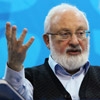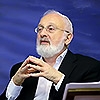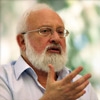Audio Version Of The Blog – 11/29/21
Listen to an Audio Version of the Blog
Download:MP3 Audio

Listen to an Audio Version of the Blog
Download:MP3 Audio
My new article on Linkedin “Money Can’t Feed the People that the Ego Starves”
David Beasley, executive director of the United Nations World Food Programme, said that billionaires “need to step up now, on a one-time basis,” and donate $6 billion to save 42 million people “who are going to die if we don’t reach them.” He also said, “I’m not asking them to do this every day, every week, every year; we have a one-time crisis, a perfect storm of conflict, climate change, and Covid.” If Mr. Beasley believes that this is a one-time crisis and that six billion dollars will eliminate world hunger, he is probably the only one. Hunger does not exist for the reasons he cites, but because of human selfishness, and no amount of money is large enough to feed the people that the ego starves.
Hunger does not exist for the reasons he cites, but because of human selfishness, and no amount of money is large enough to feed the people that the ego starves.
Nor will money satisfy the ego. On the contrary, money only makes the problem worse because it goes into the pockets of the wrong people, who become even greedier, while those who could make good use of it see very little of it. If we believe that we can solve the hunger crisis with money alone, hunger will surely increase and many more will die.
In fact, I believe that our approach of fighting the symptoms rather than the pathogen itself will make things so bad that it would be better for us not to live through those times. There will be abundance, yet acute shortage of the most important staples like bread and water all at the same time. People will be miserable.
You will see entire battalions guarding food while others starve nearby. It will not be done in secret, but in plain sight; you will see it in the news. Those who have will say they feel sorry for the starving, but they will not lift a finger.
The ego will never let us feel satisfied. It will always make us feel empty, however rich we are. Even if we deny all the people in the world the most basic needs and keep them all to ourselves, we will still be unfulfilled.
The only good use we have for our egos is to realize that they are leading us to extinction. They are teaching us that as long as we focus only on ourselves, we will not feel satisfied. Once we learn this, it will drive us to rise above our selfishness.
Another thing that the ego teaches us is that we are dependent on each other. We cannot feel rich unless we compare ourselves to others who are poorer than us. We cannot have what we want unless someone brings it to us. In other words, we cannot live, and we cannot evaluate ourselves without other people around us.
Since we cannot get rid of egoism, as it is our core, we must “teach” it the value of cooperation and consideration. When our egos learn that it is in their best interest to be considerate, they will enable us to enjoy unselfish pleasures and we will stop humiliating other people and destroying our environment, which are currently our only pleasures (whether we admit it to ourselves or not).
We can find joy in connection and consideration only if we give up trying to satisfy our ego. We can come to it by seeing what our egos have done to us and to the world around us, or we can come to it by waiting for disasters to strike us personally. The first way is faster, easier, and safer. I hope we choose it before we experience the disadvantages of egoism first hand.
[290348]
My new article on Linkedin “No One Loves a Nation Whose Members Hate Each Other”
I have been told that the problems in supply chains afflicting the global economy have gotten so bad, and the prognosis is so dire, that some countries are considering shutting down international trade and trying to become self-sufficient. It is clearly an impractical idea, but it shows how desperate some countries have become, and how pessimistic they are about the future. There is a solution, but it involves reciprocity and consideration of others, and no one wants to go that way. So, for the time being, we will continue to suffer.
Look at what we have done to our planet. We have polluted it, corrupted it, and depleted it of resources and much of its beauty for the illusion of power and control. We could have achieved so much more with a fraction of the effort and a fraction of the resources we have drained from the planet, but for this, we would have to work shoulder to shoulder with each other, and no one wants that.
Regrettably, the situation will continue to worsen until everyone points their finger at the Jews and blame them for everything that is wrong with the world. Around this, everyone will be happy to unite, and not around anything else.
It is not only the world, but many Jews feel guilty, too. Look at how many Jews justify Jew-haters! Moreover, Jews who do so are not treated as traitors, as they would be anywhere else, but as progressive, justice-seeking people. Why are we like that? It is because deep down, we feel that the world is correct in its accusations, that we really are responsible for the world’s troubles. We cannot rationalize it, but we feel it nonetheless. Even if we do not admit it, our meek resentment to the most absurd allegations proves that we do not feel innocent.
Especially now, when the world has become such an interdependent, closed system where everyone affects everyone else, anything bad that someone does immediately impacts the entire world. We, Jews, are expected to correct the world. Since the world is broken, in the eyes of the world, as well as in our own eyes, it is our fault.
Think about it, no nation has conceived such a notion as Tikkun Olam [correction of the world], certainly not as one of its core values and goals. No nation has pinned its entire essence on love of others, to the point where one loves one’s neighbor as oneself. No nation has made mutual responsibility such a deeply rooted principle that its members feel entitled to demand it of each other. And finally, the sages of no other nation blame their defeats on unfounded hatred among the members of the nation, instead of on external enemies.
Even with regard to the nations of the world, our calling has always been a positive one. As soon as we became a nation, we were designated as a chosen people—chosen to exemplify those core values just mentioned: Tikkun Olam through love of others and mutual responsibility. Is there anything the world needs more than these?
Yet, instead of living up to our vocation, we have become the opposite. We are a display of self-loathing, inner division, and mutual derision. We are arrogant, but we have nothing to be proud of since people don’t need technology; they need to love and be loved, and we are denying them their needs through our negligence in our duty.
No one loves a nation whose members hate each other, all the more so when that nation was forged to be the trailblazer toward unity. If we reject our calling, who will pave the trail?
We are an assortment of members of nations from all over the Near and Middle East, who once united “as one man with one heart.” Because of our unique example, we must lead the way for the unity of the world, and the only way to do it is through our example.
Each of us is a descendant of those members of the nations. The nations will not be able to unite without our example. Our ancestors were “ambassadors” of the nations, and we are their heirs; it is incumbent upon us to carry out our ancestors’ legacy: to be a light unto nations and redeem the world of hatred. If we unite among us, the world will follow through. If we shun one another, the world will shun us.
[290342]
 Michael Laitman, On Quora: “What is the difference between Kabbalah and Eastern teachings?“
Michael Laitman, On Quora: “What is the difference between Kabbalah and Eastern teachings?“
There are over 4,000 religions and beliefs in the world. The main religions stem from Abraham, who lived in ancient Babylon close to 3,500 years ago.
Abraham taught his method, the wisdom of Kabbalah, to a small group that he called “the people of Israel.” He also gave gifts, or other forms of faith, to the rest of the people. The Torah states that Abraham gave gifts to the children of his concubines and sent them eastward, where these methods reach back to us.
The difference is that Abraham’s method possesses the ability to correct a person, something that exists in no other method.
Kabbalah gives us the ability to attract the positive force toward us, which is concealed in nature, and which will correct our hatred toward each other by covering it with love.
The positive force becomes added to our egoistic nature and we then possess two forces. Their incorporation makes it possible for us to work with them, develop by redirecting our self-aimed desires in a direction of positively connecting to others, and discover an additional form of reality that is outside of us.
Modern physics discusses the existence of such a reality. Other than the universe, i.e. the world that we now perceive, there are other forms of reality.
The wisdom of Kabbalah makes it possible for us to break through our world’s limits and enter into the perception of higher worlds.
We have no such possibilities in other methods because they provide no access to the force that we can attract through the study that gives us the ability to make such a breakthrough. In the wisdom of Kabbalah, such a force is named the “reforming light.” That is, the uniqueness of the wisdom of Kabbalah is that it lets us attract this force that corrects our egoistic nature, elevating us above it to an opposite nature of love and bestowal, while we alive in our world. It is as is described in kabbalistic texts, that “You will see your world in your lifetime” (Berachot 17a).
Based on a talk “Short Stories” with Kabbalist Dr. Michael Laitman on October 22, 2014. Written/edited by students of Kabbalist Dr. Michael Laitman.
 Question: Who determines the fate of a person? You write in your blog that fate depends on the root of one’s soul. Even the Creator does not determine this, but everything is written in the root of the soul. What are we talking about?
Question: Who determines the fate of a person? You write in your blog that fate depends on the root of one’s soul. Even the Creator does not determine this, but everything is written in the root of the soul. What are we talking about?
Answer: The root of a soul is the initial normative data in a person that he must implement.
These initial data, the so-called Reshimot, force a person to act in a certain way and lead him to his ideal state. What depends on a person is only the time he spends on the realization of this path: faster, slower, in a more comfortable way, or through suffering. In other words, the fate of a person is predetermined, but it depends on him how he will go through it, how long it will take, and how he will feel in these deterministic states.
Our freedom lies only in how to perceive the deterministic path of our development and how to implement it in the best way.
Question: So, I am just changing my reaction?
Answer: But this means a lot, because depending on our reaction, we influence the upper force in a positive or negative way.
[289797]
From KabTV’s “Spiritual States” 10/26/21
Related Material:
Fate
The Connection Between Our Fate And The Stars
Do The Stars Affect Our Fate?
 Question: How can we distinguish laziness from dangerous, harmful inaction?
Question: How can we distinguish laziness from dangerous, harmful inaction?
Answer: Laziness is a very useful property. If only it prevailed in humanity and did not push us to do all sorts of stupid things, then we would generally live well.
Everyone would move like a sloth. Do you know how they move? If we were all like that, it would be great!
Laziness is a very good property. It is not for nothing that the Torah says: “Sit and do nothing – better.” If you can do nothing, don’t. The world won’t stop. You will not stop this terrible progress, everything will spin. And you take part in it as much as you have to. But it’s no longer worth twitching somewhere and doing something.
In general, Kabbalah is not in favor of developing a person technically. It is for developing him only internally.
[290089]
From Kab TV’s “Conversations” 11/1/21
Related Material:
Laziness: A Wonderful Quality
The Remedy Against Laziness
The Punishment For Laziness
 Question: What are miracles and why are they performed?
Question: What are miracles and why are they performed?
Answer: There are no miracles! There are no miracles in the world.
Question: Then what is presented in the Torah as miracles from above? For example: the Creator helping the Israelites, etc.
Answer: This allegorically describes the state of people who understand the Creator and His control of the world. For a person who attains this, everything is a miracle because he relates everything to the Creator.
Question: Why does the Creator do those miracles?
Answer: It is simply that all actions the Creator performs in nature are aimed at raising a person to His level, at teaching him. We constantly live in the Creator and we are always in His actions. The whole world is the actions of the Creator. And therefore, everything is a miracle.
Or you can say the opposite, that there are no miracles. We are in a system ruled by the Creator. Absolutely, completely, in everything! It depends on how we perceive this system. It all depends on the level a person is at, on his development.
And when it writes: “The Creator performed a miracle,” it means something unusual, not something that happens every day according to the program of creation.
Question: Why is the Creator doing this? Do people need proof?
Answer: This is necessary in order to shake a person, raise him to the next level of awareness, action, etc.
Comment: Still, a person is weak, he needs miracles.
My Response: No. He perceives revelation of the Creator in this way as kind of a reward, a connection with the Creator. But, in principle since we do not foresee these actions in advance, they are for us something extraordinary—a miracle.
[289910]
From KabTV’s “Secrets of the Eternal Book” 9/20/21
Related Material:
New Life 473 – The Miracles And Wonders
Miracles Don’t Happen
The Force That Performs Miracles
 Question: What does “to hear” and “to see” mean in Kabbalah?
Question: What does “to hear” and “to see” mean in Kabbalah?
Answer: “To hear” is the level of Bina, “to see” is the level of Hochma.
If I am at the level of Bina, then I hear what the Creator tells me. And if I am at the level of Hochma, then I see my contact with the Creator, and this is already a huge level.
Question: What does the “sound of the horn” mean, from which the walls of Jericho fall?
Answer: This is a very large stage of mercy that destroys egoistic protection.
[290124]
From KabTV’s “Secrets of the Eternal Book” 9/20/21
Related Material:
“And It Was At The Seventh Time, The Priests Blew With The Trumpets”
Between The World And The Creator
By Raising Ourselves, We Raise The World
Answer: MAN is what a person turns to the Creator with, but not something, as it were, that falls from above. From the Kabbalistic point of view, MAN is considered the opportunity to turn to the Creator. But this is a more serious, sane interpretation.
And when it is said that MAN falls from above, it means that a person who appeals to the Creator receives an answer from Him. This answer manages everything in a person and corrects him to the level where he begins to receive another contact with the Creator.
[290026]
From KabTV’s “Secrets of the Eternal Book” 9/20/21
Related Material:
MAN: The Prayer That Contains Everything
A Prayer Is A Force
Returning To Bestowal
 Comment: Lyuda writes to you: “I decided to write to you after a year and a half of watching your clips. Everyone considers me a good, sympathetic, kind person, but I suddenly discovered that there is not an ounce of love in me.
Comment: Lyuda writes to you: “I decided to write to you after a year and a half of watching your clips. Everyone considers me a good, sympathetic, kind person, but I suddenly discovered that there is not an ounce of love in me.
The person closest to me is suffering and I do not feel his pain. I play at being compassionate, but I do not have it in me. I do not want to be like this, I do not feel good about being like this. I am afraid to admit it to others, and I am writing to you, signing with an alias, Lyuda.”
My Response: Maybe she just has grown up. When we grow up, then, as it is written in Ecclesiastes: “He who increases knowledge, increases pain.”
Question: Does it mean that her knowledge about who a person is has increased?
Answer: Just the recognition of life as an unhappy existence in a terrible, bad state called “egoism.” She is suffering from it, and this is already a good thing.
Question: How can she not suffer?
Answer: To use correctly, productively, negative feelings toward her state in order to rise from this state to a higher one.
Question: What is the higher state? She feels that she does not have compassion for the person closest to her.
Answer: To rise to a higher state means to have more compassion, to be closer to people. To try to develop the correct attitude toward them, that is, kindness, up to love, and so on.
Question: Is the fact that she writes “I do not have a single gram of love in me” kind of a start?
Answer: Of course. This is very good.
Question: So, a person starts from this. Then tell me, how can a person come to love? You say, “She should be kinder, she should love.”
Answer: No, I am not talking about that. She cannot do it herself, so we cannot impose on her any other states. We can only advise her of a few techniques by which she will be able to change these states within herself. Not directly.
A person cannot do that, a person is not the Creator. He cannot switch some switches in himself and suddenly feel compassion and suddenly love. This is not us. But we can indirectly invite upon ourselves the upper light, the upper energy, the upper influence, and it will correct us, and change us.
Question: Does it mean that from the realization that “there is not an ounce of love in me” suddenly she will feel that there is love in her? From the state that she has no compassion for a loved one at all, will she feel that she has it?
Answer: Yes. In addition, she will begin to explore her attitude to the world, to people, to everything, and eventually to the Creator, who, in principle, is the source of all her conceptions about the world. That is, everything that she actually sees in the world, inanimate, vegetative, and animate nature and people, will eventually connect within her into the image of the Creator, that is, the upper force that projects for her such a state.
Question: Are you saying that it is the Creator who evokes this feeling in her?
Answer: Yes! It is written about this that there is none else besides Him.
Question: Does He do it in order for her to understand what real compassion is and what real love is?
Answer: This is not a goal, this is only a means to attain the Creator, His purpose, why He creates such images in us. Why should we see inanimate, vegetative, animate, and human nature around us? Why are they around us in this way, influencing us, forcing us to be in interaction with them? For what?
Question: But if we try to stay closer to the letter, then why are these feelings, I do not love, I do not have compassion, awakened in me?
Answer: So that through all these influences we will attain their root, the Creator. All these influences have one single root, source, and cause. This cause wants you to attain it, to come closer to it.
Question: What will happen then? Is this some kind of invitation from the Creator to attain Him?
Answer: He invites you on a date with Him. It is easy for Him.
Question: If a person decides and goes on a date, what will he get from it?
Answer: I will teach her. I am here as an intermediary, a matchmaker, one might say, between this woman and the Creator.
Question: Are you talking about yourself? Can you teach her how to go on this date, how to behave?
Answer: This is my profession.
Question: What will it give her?
Answer: What do we want when we want to love, to become acquainted, to get to know another person? We want to reveal our relationship. That is, as much as possible the feelings of one for the other, to explore ourselves, why we are like this, and to feel the other, why he is like that. I would say that a very interesting romance appears here between a person and the Creator.
Question: As a result, does a person attain what he wants to attain?
Answer: Love arises! And it is the biggest, the greatest, the most selfless, and the most important thing. The one that reveals absolutely everything. It turns out that everything in the world was created just for the two of you. For the two of you! This is the only reason for the existence of our world.
It turns out that there is only this person and the Creator. No one else.
Question: Can we say this about eight billion people? Can each one say “There is me and the Creator”? Is this how this meeting with the Creator should happen for everyone? Should everyone attain this love?
Answer: Yes. In a very personal way.
Comment: This is an incredible computer! Everyone has their own program!
My Response: What is complicated about this? This is the way a person reveals it. And everything else in the world is just for him. An infinite number of all kinds of variations, everything that exists, is specifically aimed at him.
Comment: Everything he sees, everything that happens, everything he reads in the newspapers, or hears…
My Response: Everything! This is the way they write a script when they need to bring this character somewhere, to some changes in him and in others, and so on. Exactly in the same way!
[290006]
From KabTV’s “News with Dr. Michael Laitman” 10/11/21
Related Material:
World Kindness Day
A Day Of Spontaneous Kindness
Being Infected By “The Meaning Of Life” Virus